Go to this link to view Big Island Video News feature story: Defected – Testing Hawaiian Sovereignty

Go to this link to view Big Island Video News feature story: Defected – Testing Hawaiian Sovereignty
In Hawai‘i there is a political trend called the sovereignty or independence movement that began in the 1970s. This political wing, which grew out of the Hawaiian cultural renaissance movement, is comprised of diverse groups of aboriginal Hawaiians working toward the goal or aspiration of achieving sovereignty or independence. These groups vary in ideologies and organization, but all of them have been operating on the false assumption that the United States has independence and sovereignty over Hawai‘i and therefore the goal is separation or secession through a process commonly referred to as self-determination. According to the United Nations, self-determination is the right of the people of a non-sovereign nation to choose their own form of governance separate from the foreign State that has the sovereignty and independence under international law.
Actions taken by these groups are centered on political activism that have taken many forms at both the national and international levels. This political trend has led to confusion regarding Hawai‘i’s true status and basic terminology and the application of the terms “sovereignty” and “independence.” Also adding to the confusion is the psychological effects of “presentism” and “confirmation bias.” Presentism is “an attitude toward the past dominated by present-day attitudes and experience,” and confirmation bias is “a tendency to search for or interpret information in a way that confirms one’s preconceptions, leading to statistical errors.”
Sovereignty by definition is absolute authority exercised by a State over its territory, territorial seas, and its nationals abroad, which is independent of other States and their authority over their territory, territorial seas, and its nationals abroad. Authority over a State’s nationals abroad is called personal supremacy, and authority over territory is territorial sovereignty. Therefore, sovereignty is associated with political independence and the terms are often interchangeable.
The term State, under international law, means a political unit that has a centralized government, a resident population, a defined territory and the ability to enter and maintain international relations with other States. A State is a legal person in international law that possesses rights and obligations. A nation, however, is a group of people bound together by a common history, language and culture. Every State is a nation or a combination of nations, but not every nation or nations comprise a State. Since the nineteenth century, a State comes into existence only if other States have recognized it, which represents the entirety of the international order. In other words, a few States may have given explicit recognition, but the majority hasn’t. Until the majority of States have provided recognition to the nation or group of nations, international law does not recognize the new State because its independence over its territory, territorial seas, and its nationals abroad has not been acknowledged by the international community of States.
The most recent example of a sovereignty movement by a nation seeking State sovereignty and independence and ultimately achieving it was Palestine. On November 29, 2012, the member States of the United Nations voted overwhelmingly to recognize Palestinian Statehood. Up to this date, Palestine was a nation seeking sovereignty and independence, which is called self-determination. Once a State has been recognized the recognizing States cannot deny it later, and there exists a rule of international law that preserves the independence of an already recognized State, unless that State has relinquished its independence and sovereignty by way of a treaty or customary practice recognized by international law.
According to the Permanent Court of International Justice (PCIJ), in the 1927 seminal case S.S. Lotus between France and Turkey, “International law governs relations between independent States. The rules of law binding upon States therefore emanate from their own free will as expressed in conventions (treaties) or by usages generally accepted as expressing principles of law and established in order to regulate the relations between these co-existing independent communities or with a view to the achievement of common aims. Restrictions upon the independence of States cannot therefore be presumed.” In other words, once a State is acknowledged as being independent it will continue to be independent unless proven otherwise. Therefore, the State will still have sovereignty and independence over its territory, territorial seas, and its nationals, even when its government has been overthrown and is militarily occupied by a foreign State. During occupations the sovereignty remains vested in the occupied State, but the authority to exercise that sovereignty is temporarily vested in the occupying State, which is regulated by the Hague and Geneva Conventions, and international humanitarian law.
When the PCIJ stated that restrictions upon the independence of States could not be presumed, it did not mean that international law could not restrict States in its relations with other States that are also independent. In the Lotus case, the PCIJ explained, “Now the first and foremost restriction imposed by international law upon a State is that—failing the existence of a permissive rule to the contrary—it may not exercise its power in any form in the territory of another State. In this sense jurisdiction is certainly territorial; it cannot be exercised by a State outside its territory except by virtue of a permissive rule derived from international custom or from convention (treaty).” The PCIJ continued, “In these circumstances, all that can be required of a State is that it should not overstep the limits which international law places upon its jurisdiction; within these limits, its title to exercise jurisdiction rests in its sovereignty.”
The United States Supreme Court in 1936 recognized this restriction and limitation of a State’s authority in international law in U.S. v. Curtiss-Wright Corp. The U.S. Supreme Court stated, “Neither the Constitution nor the laws passed in pursuance of it have any force in foreign territory unless in respect of our own citizens…, and operations of the nation in such territory must be governed by treaties, international understandings and compacts, and the principles of international law. As a member of the family of nations, the right and power of the United States in that field are equal to the right and power of the other members of the international family. Otherwise, the United States is not completely sovereign.”
In 2001, the Permanent Court of Arbitration (PCA), in its dictum in Larsen v. Hawaiian Kingdom, verified Hawai‘i to be an independent State. In its arbitral award, the PCA stated, “in the nineteenth century the Hawaiian Kingdom existed as an independent State recognized as such by the United States of America, the United Kingdom and various other States, including by exchanges of diplomatic or consular representatives and the conclusion of treaties.” As an independent State, international law provided a fundamental restriction on all States, to include the United States of America, that it may “not exercise its power in any form in the territory of another State.”
Since 1898, the United States has unlawfully exercised its power within the territory of the Hawaiian Kingdom militarily, legislatively and economically. On July 7, 1898, the United States Congress enacted a joint resolution unilaterally annexing the Hawaiian Kingdom over the protests of Hawai‘i’s Queen and people. Two years later, Congress enacted another law by creating a territorial government that took over the governmental infrastructure of the Hawaiian Kingdom that was previously high jacked by insurgents since 1893 with the support of the United States military. In 1959, the Congress again passed legislation transforming the territorial government into the 50th state of the American Union. Under both international law and United States constitutional law, these Congressional actions have no force and effect in Hawai‘i. Despite the propaganda and lies that have been perpetuated since the beginning of the occupation that Hawai‘i was annexed by a treaty, the Hawaiian Kingdom continues to be an independent State that still retains its personal supremacy over its nationals abroad, and territorial sovereignty over its territory and territorial seas. The exercising of this authority, however, is limited only by the Hague and Geneva Conventions and the fact of an illegal and prolonged occupation.
A common statement made by sovereignty advocates is that the people have to collectively decide on the question of sovereignty and that it should be put to a vote. This is incorrect if Hawai‘i is already a sovereign and independent State. This prospect is valid only if Hawai‘i is a nation seeking sovereignty and independence, which is commonly referred to as “nation-building” under a people’s right to self-determination, but Hawai‘i is not. Self-determination and nation-building is the United Nations process by which sovereignty and independence is sought, but it is not guaranteed. This process provides to the people of a non-sovereign nation who have been colonized by a foreign State to choose whether or not they want independence from the foreign State, free association as an independent State with the foreign State, or total incorporation into the foreign State.
Recently, Maohi Nui (French Polynesia) has been reaffirmed by the United Nations as having a right to choose independence from France, free association with France, or total incorporation into France. Maohi Nui is by definition a sovereignty movement and education is key to ensuring that the people decide Maohi Nui’s status through decolonization with full knowledge, and not be influenced or coerced by political activism that is French driven. It won’t be easy for Maohi Nui, but the process of exercising self-determination should be fair under United Nations supervision and in line with General Assembly resolutions.
If other independent States cannot affect or change the independence of an established State and its sovereignty under international law, how can Hawai‘i’s people believe they can do what States can’t? Because the Hawaiian Kingdom continues to exist under international law as an independent State, not only is the sovereignty movement rendered irrelevant, but also the status of Hawai‘i as an occupied State renders the State of Hawai‘i government and other federal agencies in the Hawaiian Islands self-proclaimed. It is within this international legal framework that actions taken by Federal government officials, State of Hawai‘i government officials, and County government officials are being reported to international authorities for war crimes under the Hague and Geneva Conventions, and the Rome Statute that established the International Criminal Court.
Re-education is crucial for Hawai‘i’s people and the world on the reality that Hawai‘i is an already independent and sovereign State that has been under an illegal and prolonged occupation. Before restoration of the de jure Hawaiian government takes place in accordance with the 1893 executive agreements, international law mandates that the occupying Power must establish a military government in order to administer Hawaiian Kingdom law (Article 43, Hague Convention, IV) and to also begin the withdrawal of all military installations from Hawaiian territory (Article 2, Hague Convention, V). This is the first and primary step toward transition.
The following terms and definitions are from the Hawaiian history textbook “Ua Mau Ke Ea-Sovereignty Endures.”
Independent State—A state that has absolute and independent legal and political authority over its territory to the exclusion of other states. Once recognized as independent, the state becomes a subject of international law. According to United States common law, an independent State is a people permanently occupying a fixed territory bound together by common law habits and custom into one body politic exercising, through the medium of an organized government, independent sovereignty and control over all persons and things within its boundaries, capable of making war and peace and of entering into international relations with other communities around the globe.
Sovereignty—Supreme authority exercised over a particular territory. In international law, it is the supreme and absolute authority exercised through a government, being independent of any other sovereignty. Sovereignty, being authority, is distinct from government, which is the physical body that exercises the authority. Therefore, a government can be overthrown, but the sovereignty remains.
Colonization—Colonization is the building and maintaining of colonies in one territory by people from another country or state. It is the process, by which sovereignty over the territory of a colony is claimed by the mother country or state, and is exercised and controlled by the nationals of the colonizing country or state. Though colonization there is an unequal relationship between the colonizer and the native populations that reside within its colonial territory. These native populations are referred to as indigenous peoples and form the basis of the 2007 United Nations Declaration on the Rights of Indigenous Peoples.
De-colonization—De-colonization is the political process by which a non-self-governing territory under the sovereignty of the colonizing state or country becomes self-governing. According to the United Nations Resolution 1541 (XV), Principles which should guide Members in determining whether or not an obligation exists to transmit the information called for under Article 73 e of the Charter, “A Non-Self-Governing Territory can be said to have reached a full measure of self government by: (a) Emergence as a sovereign independent State; (b) Free association with an independent State; or (c) Integration with an independent State.”
Self-determination—A principle in international law that nations have the right to freely determine their political status and pursue their economic, social and cultural development. The international community first used the term after World War I where the former territorial possessions of the Ottoman Empire and Germany were assigned to individual member countries or states of the League of Nations for administration as Mandate territories. The function of the administration of these territories was to facilitate the process of self-determination whereby these territories would achieve full recognition as an independent and sovereign state. After World War II, territories of Japan and Italy were added and assigned to be administered individual member countries or states of the United Nations, being the successor of the League of Nations, and were called Trust territories. Also added to these territories were territories held by all other members of the United Nations and called Non-self-governing territories. Unlike the Mandate and Trust territories, they were not assigned to other member countries or states for administration, but remained under the original colonial authority who reported yearly to the United Nations on the status of these territories. Self-determination for Non-self-governing territories had three options: total incorporation into the colonial country or state, free association with the colonial country or state, or complete independence from the colonial country or state. Self-determination for indigenous peoples does not include independence and is often referred to as self-determination within the country or state they reside in.
Sovereignty movement—A political movement of a wide range of groups in the Hawaiian Islands that seek to exercise self-determination under international law as a Non-self-governing unit, or to exercise internal self-determination under the 2007 United Nations Declaration on the Rights of Indigenous Peoples. The commonality of these various groups is that their political platforms are based on aboriginal Hawaiian identity and culture and use of the United Nations term indigenous people. The movement presumes that the Hawaiian Kingdom and its sovereignty were overthrown by the United States January 17th 1893, and therefore the movement is seeking to reclaim that sovereignty through de-colonization. The movement does not operate on the presumption of continuity of the Hawaiian Kingdom as an independent state and the law of occupation, but rather on the aspiration of becoming an independent state or some form of internal self-determination within the laws of the United States.
International law provides an appropriate lens to the political and legal history of the Hawaiian Islands, which has been relegated under U.S. sovereignty and the right to internal self-determination of indigenous peoples. There are inherent contradictions and divergence of thought and direction between the concepts of Hawaiian State sovereignty and Hawaiian indigeneity.
On January 18, 2001, the U.S. National Security Council made known its position on indigenous peoples to its delegations assigned to the “U.N. Commission on Human Rights,” the “Commission’s Working Group on the United Nations (UN) Draft Declaration on Indigenous Rights,” and to the “Organization of American States (OAS) Working Group to Prepare the Proposed American Declaration on the Rights of Indigenous Populations.” The Council directed these delegates to “read a prepared statement that expresses the U.S. understanding of the term internal ‘self-determination’ and indicates that it does not include a right of independence or permanent sovereignty over natural resources.”
The Council also directed these delegates to support the use of the term internal self determination in both the U.N. and O.A.S. declarations on indigenous rights, and defined Indigenous Peoples as having “a right of internal self-determination.” By virtue of that right, “they may negotiate their political status within the framework of the existing nation-state and are free to pursue their economic, social, and cultural development. This resolution sought to constrain the growing political movement of indigenous peoples “who aspire to rule their territorial homeland, or who claim the right to independent statehood under the doctrine of self-determination of peoples.”
The legal definition of a colony is “a dependent political economy, consisting of a number of citizens of the same country who have emigrated therefrom to people another, and remain subject to the mother country.” According to Albert Keller, a colonial studies scholar, colonization is “a movement of population and an extension of political power,” and therefore must be distinguished from migration.
Colonization is an extension of sovereignty over territory not subject to the sovereignty of another State, while migration is the mode of entry into the territory of another sovereign State. The “so-called ‘interior colonization’ of the Germans [within a non-German State] would naturally be a misnomer on the basis of the definition suggested.” This would suggest that the migration of United States citizens into the territory of the Hawaiian Kingdom constituted American colonization and somehow resulted in the creation of an American colony.
The history of the Hawaiian Kingdom has fallen victim to the misuse of this term by contemporary scholars in the fields of post-colonial and cultural studies. These scholars have lost sight of the original use and application of the terms colony and colonization, and have remained steadfast in their conclusion that the American presence in the Hawaiian Islands was and is currently colonial in nature. This erroneous use of the word has caused much confusion and complicates agreement on legal and political solutions.
Slavoj Zizek, a philosophy scholar, critically suggests that in post-colonial studies, the use of the term colonization “starts to function as a hegemonic notion and is elevated to a universal paradigm, so that in relations between the sexes, the male sex colonizes the female sex, the upper classes colonize the lower classes, and so on.” He argues that in cultural studies it “effectively functions as a kind of ersatz-philosophy, and notions are thus transformed into ideological universals.
In the legal and political realm, the fundamental difference between the terms colonization/de-colonization and occupation/de-occupation, is that the colonized must negotiate with the colonizer in order to acquire state sovereignty, e.g. India from Great Britain, Rwanda from Belgium, and Indonesia from the Dutch. Under the latter, State sovereignty is presumed and not dependent on the will of the occupier, e.g. Soviet occupation of the Baltic States, and the American occupation of Afghanistan and Iraq. Colonization/de-colonization is a matter that concerns the internal laws of the colonizing State and presumes the colony is not sovereign, while occupation/de-occupation is a matter of international law relating to already existing sovereign States. Matthew Craven an international law scholar who has done extensive research on the continuity of the Hawaiian State, concludes:
“For the Hawaiian sovereignty movement, therefore, acceding to their identification as an indigenous people would be to implicitly accede not only to the reality, but also to the legitimacy, of occupation and political marginalization. All they might hope for at that level is formal recognition of their vulnerability and continued political marginalization rather than the status accorded under international law to a nation belligerently occupied.”
Hawaiian State sovereignty and the international laws of occupation not only presume the continuity of Hawaiian sovereignty, but also provide the legal framework for regulating the occupier, despite its history of non-compliance. It is clear that the U.S. government wrongfully administered the Hawaiian Islands since 1898 as if it were a colonial possession for the purpose of concealing a gross violation of international law. Therefore, colonialism must be viewed as a tool used by the occupant to commit fraud in an attempt to extinguish the memory of sovereignty and the legal order of the occupied State.
Self-determination, inherent sovereignty and indigenous peoples are terms fundamentally linked not just to the concept, but to the political and legal process of de-colonization, which presupposes sovereignty to be an aspiration and not a legal reality. The effects of colonization have affected the psychological and physiological make-up of many native Hawaiians, but these effects must be reinterpreted through the lens of international law. Colonial treatment is the evidence of the violation of the law, not the political basis of a sovereignty movement. As such, these violations should serve as the measurement for reparations and compensation to a people who, against all odds, fought and continue to fight to maintain their dignity, health, language and culture, and above all, their rightful and lawful sovereign status.
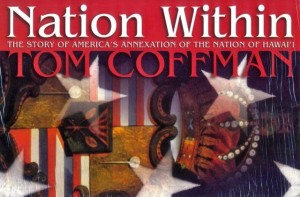 In 2009, a revised edition of Nation
In 2009, a revised edition of Nation 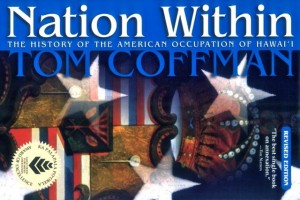 Within by Coffman was published with a significant change in its subtitle. In the original version published in 1998, the subtitle reads “The Story of America’s Annexation of the Nation of Hawai‘i,” but the revised edition now reads “The History of the American Occupation of Hawai‘i.” Coffman explains:
Within by Coffman was published with a significant change in its subtitle. In the original version published in 1998, the subtitle reads “The Story of America’s Annexation of the Nation of Hawai‘i,” but the revised edition now reads “The History of the American Occupation of Hawai‘i.” Coffman explains:
“In the book’s subtitle, the word Annexation has been replaced by the word Occupation, referring to America’s occupation of Hawai‘i. Where annexation connotes legality by mutual agreement, the act was not mutual and therefore not legal. Since by definition of international law there was no annexation, we are left then with the word occupation. In making this change, I have embraced the logical conclusion of my research into the events of 1893 to 1898 in Honolulu and Washington, D.C. I am prompted to take this step by a growing body of historical work by a new generation of Native Hawaiian scholars. Dr. Keanu Sai writes, ‘The challenge for…for the fields of political science, history, and law is to distinguish between the rule of law and the politics of power.’ In the history of Hawai‘i, the might of the United States does not make it right.”
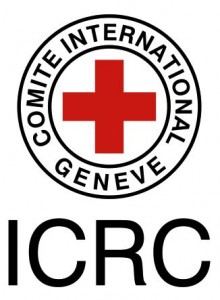 The International Committee of the Red Cross (ICRC) is a respected private organization comprised of Swiss citizens that intervenes, as a neutral party, in conflicts and occupations where international humanitarian law is being violated. Article 10 of the 1949 Geneva Convention, IV, Relative to the Protection of Civilian Persons in Time of War (Fourth Geneva Convention) acknowledges the ICRC’s right it may “undertake for the protection of civilian persons and for their relief.”
The International Committee of the Red Cross (ICRC) is a respected private organization comprised of Swiss citizens that intervenes, as a neutral party, in conflicts and occupations where international humanitarian law is being violated. Article 10 of the 1949 Geneva Convention, IV, Relative to the Protection of Civilian Persons in Time of War (Fourth Geneva Convention) acknowledges the ICRC’s right it may “undertake for the protection of civilian persons and for their relief.”
The ICRC plays an important role as a non-government organization because it is not confined or limited by the politics of governments. According to its mission statement, the ICRC “is an impartial, neutral and independent organization whose exclusively humanitarian mission is to protect the lives and dignity of victims of armed conflict and other situations of violence and to provide them with assistance.” This mission statement is drawn from Article 30 of the Fourth Geneva Convention, which provides “Protected persons shall have every facility for making application to the…International Committee of the Red Cross…as well as to any organization that might assist them.”
In 1958, the ICRC published a commentary of the Fourth Geneva Convention. The following commentary is made in reference to Article 47—Inviolability of Rights. Article 47 states, “Protected persons who in occupied territory shall not be deprived, in any case or in any manner whatsoever, of the benefits of the present Convention by any change introduced, as the result of the occupation of a territory, in to the institutions or government of the said territory, nor by any agreement concluded between the authorities of the occupied territories and the Occupying Power, nor by any annexation by the latter of the whole or part of the occupied territory.”
***********************
1. General—The position of Article 47 at the beginning of the Section dealing with occupied territories underlines the cardinal importance of the safeguard it proclaims. During the Second World War whole populations were excluded from the application of the laws governing occupation and were thus denied the safeguards provided by those laws and left at the mercy of the Occupying Power. In order to avoid a repetition of this state of affairs, the authors of the [Fourth Geneva] Convention made a point of giving these rules an absolute character. They will be considered in the following pages in the order in which they occur in the Convention.
2. Changes in the institutions or the government of the occupied territory—During the Second World War Occupying Powers intervened in the occupied countries on numerous occasions and in a great variety of ways, depending on the political aim pursued; examples are changes in constitutional forms or in the form of government, the establishment of new military or political organizations, the dissolution of the State, or the formation of new political entities.
International law prohibits such actions, which are based solely on the military strength of the Occupying Power and not on a sovereign decision by the occupied State. Of course the Occupying power usually tried to give some colour of legality and independence to the new organizations, which were formed in the majority of cases with the co-operation of certain elements among the population of the occupied country, but it was obvious that they were in fact always subservient to the will of the Occupying Power. Such practices were incompatible with the traditional concept of occupation (as defined in Article 43 of the Hague Regulations of 1907) according to which the occupying authority was to be considered as merely being a de facto administrator.
This provision of the Hague Regulations is not applicable only to the inhabitants of the occupied territory; it also protects the separate existence of the State, its institutions and its laws. This provision does not become in any way less valid because of the existence of the [Fourth Geneva] Convention, which merely amplifies it so far as the question of the protection of civilians is concerned.
Interference by the Protecting Power with the institutions or government of an occupied country has the effect of transforming the country’s structure and organizations more or less radically. Such a transformation may make the position of the inhabitants worse, and the present Article is intended to prevent from harming protected persons measures taken by the Occupying Power with a view to restoring and maintaining law and order. It does not expressly prohibit the Occupying Power from modifying the institutions or government of the occupied territory. Certain changes might conceivably be necessary and even an improvement; besides, the text is question is of an essentially humanitarian character; its object is to safeguard human beings and not to protect political institutions and government machinery of the States as such. The main point, according to the [Fourth Geneva] Convention, is that changes made in the international organization of the State must not lead to protected persons being deprived of the rights and safeguards provided for them. Consequently it must be possible for the Convention to be applied to them in its entirety, even if the Occupying Power has introduced changes in the institutions or government of the occupied territory.
3. Agreement concluded between the authorities of the occupied territory and the Occupying Power—Agreements concluded with the authorities of the occupied territory represent a more subtle means by which the Occupying Power may try to free itself from the obligations incumbent on it under occupation law; the possibility of concluding such agreements is therefore strictly limited by Article 7, paragraph 1, and the general rule expressed there is reaffirmed by the present provision. It may thus be regarded as a provision applying the safeguards embodied in Article 7, which are valid for the whole [Fourth Geneva] Convention; reference should therefore be made to the comments on that Article.
It should be noted, however, that the Diplomatic Conference wished to reaffirm that general rule by re-stating it at the beginning of the chapter dealing with occupied territory for a particular reason; because there is in this case a particularly great danger of the Occupying Power forcing the Power whose territory is occupied to conclude agreements prejudicial to protected persons. Cases have in fact occurred where the authorities of an occupied territory have, under pressure from the Occupying Power, refused to accept supervision by a Protecting Power, banned the activities of humanitarian organizations and tolerated the forcible enlistment or deportation of protected persons by the occupying authorities. Such stipulations are in flagrant contradiction with Articles 9, 39 and 51 of the [Fourth Geneva] Convention and are consequently strictly forbidden.
Lastly it will be noted that the same clause applies both to cases where the lawful authorities in the occupied territory have concluded a derogatory agreement with the Occupying Power and to cases where that Power has installed and maintained a government in power.
4. Annexation—The occupation of territory in wartime is essentially a temporary, de facto situation, which deprives the occupied Power of neither its statehood nor its sovereignty; it merely interferes with its power to exercise its rights. That is what distinguishes occupation from annexation, whereby the Occupying Power acquires all or part of the occupied territory and incorporates it in its own territory.
Consequently occupation as a result of war, while representing actual possession to all appearances, cannot imply any right whatsoever to dispose of territory. As long as hostilities continue the Occupying Power cannot therefore annex the occupied territory, even if it occupied the whole of the territory concerned. A decision on that point can only be reached in the peace treaty. That is a universally recognized rule which is endorsed by jurists and confirmed by numerous rulings of international and national courts.
And yet the Second World War provides us with several examples of “anticipated annexation,” as a result of unilateral action on the part of the victor to dispose of territory he had occupied. The population of such territories, which often covered a wide area, did not enjoy the benefit of the rules governing occupation, were without the rights and safeguards to which they were legitimately entitled, and were thus subjected to whatever laws or regulations the annexing State wished to promulgate.
Aware of the extremely dangerous nature of such proceedings, which leave the way open to arbitrary actions and decisions, the Diplomatic Conference felt it necessary to stipulate that actions of this nature would have no effect on the rights of protected persons, who would, in spite of them, continue to be entitled to the benefits conferred by the Convention.
It will be well to note that the reference to annexation in this Article cannot be considered as implying recognition of this manner of acquiring sovereignty. The preliminary work on the subject confirms this. In order to bring out more clearly the unlawful character of annexation in wartime, the government experts of 1947 proposed adding the adjective “alleged” before the word “annexation.” Several delegates at the Diplomatic Conference, concerned about the same point, went as far as to propose cutting out the reference to a hypothetical annexation in this Article. The Conference eventually decided to keep it because they considered that these fears were unfounded and also felt that it was wiser to mention such a situation in the text of the Article, in order to be better armed to meet it.
A fundamental principle emerges from the foregoing considerations; an Occupying Power continues to be bound to apply the Convention as a whole even when, in disregard of the rules of international law, it claims during a conflict to have annexed all or part of an occupied territory.
November 28th is the most important national holiday in the Hawaiian Kingdom. It is the day Great Britain and France formally recognized the Hawaiian Islands as an “independent state” in 1843, and has since been celebrated as “Independence Day,” which in the Hawaiian language is “La Ku‘oko‘a.” Here follows the story of this momentous event from the Hawaiian Kingdom Board of Education history textbook titled “A Brief History of the Hawaiian People” published in 1891.
**************************************
The First Embassy to Foreign Powers—In February, 1842, Sir George Simpson and Dr. McLaughlin, governors in the service of the Hudson Bay Company, arrived at Honolulu 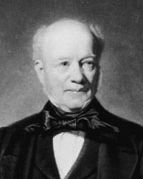 on business, and became interested in the native people and their government. After a candid examination of the controversies existing between their own countrymen and the Hawaiian Government, they became convinced that the latter had been unjustly accused. Sir George offered to loan the government ten thousand pounds in cash, and advised the king to send commissioners to the United States and Europe with full power to negotiate new treaties, and to obtain a
on business, and became interested in the native people and their government. After a candid examination of the controversies existing between their own countrymen and the Hawaiian Government, they became convinced that the latter had been unjustly accused. Sir George offered to loan the government ten thousand pounds in cash, and advised the king to send commissioners to the United States and Europe with full power to negotiate new treaties, and to obtain a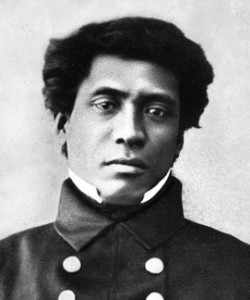 guarantee of the independence of the kingdom.
guarantee of the independence of the kingdom.
Accordingly Sir George Simpson, Haalilio, the king’s secretary, and Mr. Richards were appointed joint ministers-plenipotentiary to the three powers on the 8th of April, 1842.
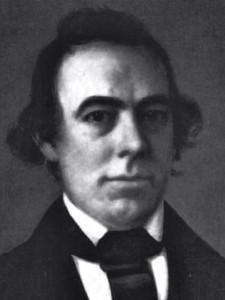 Mr. Richards also received full power of attorney for the king. Sir George left for Alaska, whence he traveled through Siberia, arriving in England in November. Messrs. Richards and Haalilio sailed July 8th, 1842, in a chartered schooner for Mazatlan, on their way to the United States*
Mr. Richards also received full power of attorney for the king. Sir George left for Alaska, whence he traveled through Siberia, arriving in England in November. Messrs. Richards and Haalilio sailed July 8th, 1842, in a chartered schooner for Mazatlan, on their way to the United States*
*Their business was kept a profound secret at the time.
Proceedings of the British Consul—As soon as these facts became known, Mr. Charlton followed the embassy in order to defeat its object. He left suddenly on September 26th, 1842, for London via Mexico, sending back a threatening letter to the king, in which he informed him that he had appointed Mr. Alexander Simpson as acting-consul of Great Britain. As this individual, who was a relative of Sir George, was an avowed advocate of the annexation of the islands to Great Britain, and had insulted and threatened the governor of Oahu, the king declined to recognize him as British consul. Meanwhile Mr. Charlton laid his grievances before Lord George Paulet commanding the British frigate “Carysfort,” at Mazatlan, Mexico. Mr. Simpson also sent dispatches to the coast in November, representing that the property and persons of his countrymen were in danger, which introduced Rear-Admiral Thomas to order the “Carysfort” to Honolulu to inquire into the matter.
Recognition by the United States—Messres. Richards and Haalilio arrived in Washington early in December, and had several interviews with Daniel Webster, the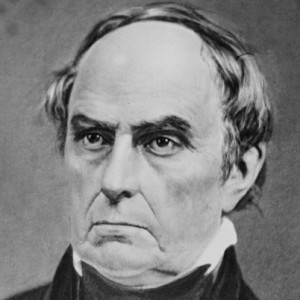 Secretary of State, from whom they received an official letter December 19th, 1842, which recognized the independence of the Hawaiian Kingdom, and declared, “as the sense of the government of the United States, that the government of the Sandwich Islands ought to be respected; that no power ought to take possession of the islands, either as a conquest or for the purpose of the colonization; and that no power ought to seek for any undue control over the existing government, or any exclusive privileges or preferences in matters of commerce.” *
Secretary of State, from whom they received an official letter December 19th, 1842, which recognized the independence of the Hawaiian Kingdom, and declared, “as the sense of the government of the United States, that the government of the Sandwich Islands ought to be respected; that no power ought to take possession of the islands, either as a conquest or for the purpose of the colonization; and that no power ought to seek for any undue control over the existing government, or any exclusive privileges or preferences in matters of commerce.” *
*The same sentiments were expressed in President Tyler’s message to Congress of December 30th, and in the Report of the Committee on Foreign Relations, written by John Quincy Adams.
Success of the Embassy in Europe—The king’s envoys proceeded to London, where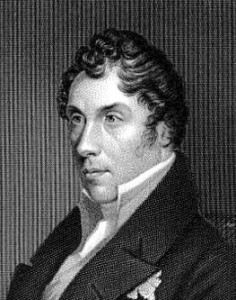 they had been preceded by the Sir George Simpson, and had an interview with the Earl of Aberdeen, Secretary of State for Foreign Affairs, on the 22d of February, 1843.
they had been preceded by the Sir George Simpson, and had an interview with the Earl of Aberdeen, Secretary of State for Foreign Affairs, on the 22d of February, 1843.
Lord Aberdeen at first declined to receive them as ministers from an independent state, or to negotiate a treaty, alleging that the king did not govern, but that he was “exclusively under the influence of Americans to the detriment of British interests,” and would not admit that the government of the United States had yet fully recognized the independence of the islands.
Sir George and Mr. Richards did not, however, lose heart, but went on to Brussels March 8th, by a previous arrangement made with Mr. Brinsmade. While there, they had an interview with Leopold I., king of the Belgians, who received them with great courtesy, and promised to use his influence to obtain the recognition of Hawaiian independence. This influence was great, both from his eminent personal qualities and from his close relationship to the royal families of England and France.
Encouraged by this pledge, the envoys proceeded to Paris, where, on the 17th, M. Guizot, the Minister of Foreign Affairs, received them in the kindest manner, and at once engaged, in behalf of France, to recognize the independence of the islands. He made the same statement to Lord Cowley, the British ambassador, on the 19th, and thus cleared the way for the embassy in England.
They immediately returned to London, where Sir George had a long interview with Lord Aberdeen on the 25th, in which he explained the actual state of affairs at the islands, and received an assurance that Mr. Charlton would be removed. On the 1st of April, 1843, the Earl of Aberdeen formally replied to the king’s commissioners, declaring that “Her Majesty’s Government are willing and have determined to recognize the independence of the Sandwich Islands under their present sovereign,” but insisting on the perfect equality of all foreigners in the islands before the law, and adding that grave complaints had been received from British subjects of undue rigor exercised toward them, and improper partiality toward others in the administration of justice. Sir George Simpson left for Canada April 3d, 1843.
Recognition of the Independence of the Islands—Lord Aberdeen, on the 13th of June, assured the Hawaiian envoys that “Her Majesty’s government had no intention to retain possession of the Sandwich Islands,” and a similar declaration was made to the governments of France and the United States.
At length, on the 28th of November, 1843, the two governments of France and England united in a joint declaration to the effect that “Her Majesty, the queen of the United Kingdom of Great Britain and Ireland, and His Majesty, the king of the French, taking into consideration the existence in the Sandwich Islands of a government capable of providing for the regularity of its relations with foreign nations have thought it right to engage reciprocally to consider the Sandwich Islands as an independent state, and never to take possession, either directly or under the title of a protectorate, or under any other form, of any part of the territory of which they are composed…”
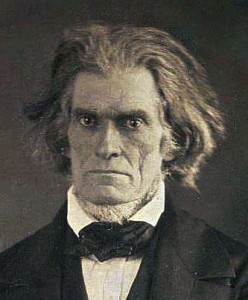 This was the final act by which the Hawaiian Kingdom was admitted within the pale of civilized nations. Finding that nothing more could be accomplished for the present in Paris, Messrs. Richards and Haalilio returned to the United States in the spring of 1844. On the 6th of July they received a dispatch from Mr. J.C. Calhoun, the Secretary of State, informing them that the President regarded the statement of Mr. Webster and the appointment of a commissioner “as a full recognition on the part of the United States of the independence of the Hawaiian Government.”
This was the final act by which the Hawaiian Kingdom was admitted within the pale of civilized nations. Finding that nothing more could be accomplished for the present in Paris, Messrs. Richards and Haalilio returned to the United States in the spring of 1844. On the 6th of July they received a dispatch from Mr. J.C. Calhoun, the Secretary of State, informing them that the President regarded the statement of Mr. Webster and the appointment of a commissioner “as a full recognition on the part of the United States of the independence of the Hawaiian Government.”
On November 11, 2013, Dr. David Keanu Sai, as Ambassador-at-large for the acting government of the Hawaiian Kingdom, was invited by the Swiss Diplomats-Zurich Network to present on the status of the Hawaiian Kingdom at the University of Zurich. Dr. Sai was received and introduced as the Ambassador-at-large of the Hawaiian Kingdom with all the diplomatic protocol and etiquette.
The program began promptly at 6:30 pm with an introduction by Dr. Max Schweizer,  Executive Director of the Swiss Diplomats-Zurich Network, welcoming everyone in attendance, which included former Swiss Ambassadors and Diplomats, students from the University of Zurich’s Center of Foreign Affairs & Applied Diplomacy, as well as
Executive Director of the Swiss Diplomats-Zurich Network, welcoming everyone in attendance, which included former Swiss Ambassadors and Diplomats, students from the University of Zurich’s Center of Foreign Affairs & Applied Diplomacy, as well as  people from the public sector. Dr. Schweizer is Head of the Center of Foreign Affairs & Applied Diplomacy that trains future diplomats from Switzerland and other foreign countries. Dr. Schweizer also introduced Maximilian Stern, Executive Director of foraus, a think-tank for Swiss Foreign Policy, which co-sponsored the event.
people from the public sector. Dr. Schweizer is Head of the Center of Foreign Affairs & Applied Diplomacy that trains future diplomats from Switzerland and other foreign countries. Dr. Schweizer also introduced Maximilian Stern, Executive Director of foraus, a think-tank for Swiss Foreign Policy, which co-sponsored the event.
At 6:40 pm Professor Niklaus Schweizer, a former Honorary Swiss Consul and current member of the Swiss Diplomats-Zurich Network, provided a short 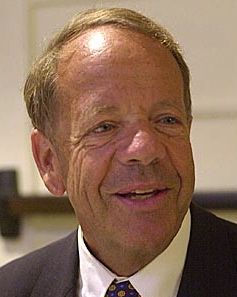 presentation on the historical background of Swiss-Hawaiian relations. Professor Schweizer is also a faculty member at the University of Hawai‘i at Manoa and teaches a college course titled Europeans in the Pacific. Professor Schweizer also provided an incredible link from Huldrych Zwingli (1484-1531), who was a religious leader of the Reformation in Zurich, to John Calvin (1509-1564) who was part of the Reform in Geneva, Switzerland, to the Calvinist missionaries from the United States that arrived on the island of Hawai‘i in 1820. His presentation ended by stating there is a lot more history to Hawai‘i than Waikiki and tourism.
presentation on the historical background of Swiss-Hawaiian relations. Professor Schweizer is also a faculty member at the University of Hawai‘i at Manoa and teaches a college course titled Europeans in the Pacific. Professor Schweizer also provided an incredible link from Huldrych Zwingli (1484-1531), who was a religious leader of the Reformation in Zurich, to John Calvin (1509-1564) who was part of the Reform in Geneva, Switzerland, to the Calvinist missionaries from the United States that arrived on the island of Hawai‘i in 1820. His presentation ended by stating there is a lot more history to Hawai‘i than Waikiki and tourism.
Dr. Sai then followed with his power point presentation Hawai‘i: An American State or a 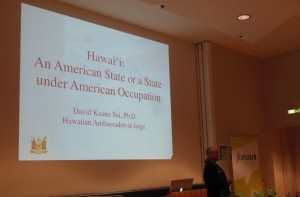 State under American Occupation. The presentation covered the legal and political history of the Hawaiian Kingdom; its treaty with Switzerland, the illegal overthrow; the ensuing illegal and prolonged occupation by the United States; the Protest and Demand filed with the United Nations General Assembly; the Referral filed with the International Criminal Court; the Application Instituting Proceedings at the International Court of Justice with Switzerland named as a defendant; and the ongoing commission of war crimes. A panel discussion immediately followed the presentation.
State under American Occupation. The presentation covered the legal and political history of the Hawaiian Kingdom; its treaty with Switzerland, the illegal overthrow; the ensuing illegal and prolonged occupation by the United States; the Protest and Demand filed with the United Nations General Assembly; the Referral filed with the International Criminal Court; the Application Instituting Proceedings at the International Court of Justice with Switzerland named as a defendant; and the ongoing commission of war crimes. A panel discussion immediately followed the presentation.
The panel was comprised of Dr. Sai, Professor Schweizer and Dr. Christian Blickenstorfer, who is President of the Swiss Diplomats-Zurich Network as well as former Swiss Ambassador to the United States, Saudi Arabia, United Arab Emirates, Oman, Yemen, and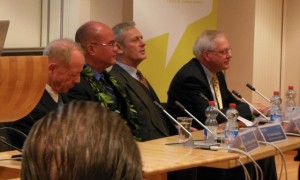 Germany. Dr. Schweizer moderated the panel. Dr. Blickenstorfer stated that when he visited the Hawaiian Islands while Ambassador to the United States, he clearly saw two versions of the Hawaiian Islands that he didn’t expect. First was the perception that Hawai‘i was the 50th State of the United States and the other was a kingdom with a Palace and the Royal Hawaiian Band. He clearly didn’t understand the distinction until Dr. Sai’s presentation, which he said was very informative and clear. Dr. Schweizer then asked Dr. Sai about his position as Ambassador-at-large and if he could explain to the audience his position and how he was appointed. Dr. Sai responded with a short narrative of how the acting government was established in 1996 utilizing laws of the Hawaiian Kingdom as it existed before the occupation in the provisional and temporary establishment of a Regency that was provided for under the Hawaiian constitution under the legal doctrine of necessity. The panelists and audience understood the application of the doctrine of necessity as it applies to government.
Germany. Dr. Schweizer moderated the panel. Dr. Blickenstorfer stated that when he visited the Hawaiian Islands while Ambassador to the United States, he clearly saw two versions of the Hawaiian Islands that he didn’t expect. First was the perception that Hawai‘i was the 50th State of the United States and the other was a kingdom with a Palace and the Royal Hawaiian Band. He clearly didn’t understand the distinction until Dr. Sai’s presentation, which he said was very informative and clear. Dr. Schweizer then asked Dr. Sai about his position as Ambassador-at-large and if he could explain to the audience his position and how he was appointed. Dr. Sai responded with a short narrative of how the acting government was established in 1996 utilizing laws of the Hawaiian Kingdom as it existed before the occupation in the provisional and temporary establishment of a Regency that was provided for under the Hawaiian constitution under the legal doctrine of necessity. The panelists and audience understood the application of the doctrine of necessity as it applies to government.
Questions were then taken from the audience that centered on the economy of the Hawaiian Kingdom and how would it look like during and after the occupation ends. Another question was by a Swiss Human Rights activist asking for Dr. Sai’s response to actions taken by Mr. Leon Siu who is trying to get Hawai‘i listed on the United Nations list of colonies in order for Hawai‘i to be de-colonized. She explained that Mr. Siu stated to her that all it takes is one country to support Hawai‘i’s listing, and she asked Dr. Sai for his thoughts or whether or not Switzerland could be that country. Dr. Sai’s responded that it was not the appropriate action to be taken regarding Hawai‘i’s occupation, because to say that Hawai‘i is a colony of the United States is to imply that Hawai‘i is not an already existing sovereign, but occupied, State. He explained that de-colonization is the process of self-determination where the population of a colony will decide whether it wants one of three options; first, to be an independent and sovereign State; second, a status of free association with the former colonizer; or, third, total incorporation into the sovereignty of the colonizer. Because Hawai‘i’s government was illegally overthrown by the United States, does not mean Hawai‘i became a U.S. colony. The diplomats in the audience understood Dr. Sai’s response and agreed that de-colonization is not the process because the issue is State continuity and not the creation of State.
After the panel there was time for everyone to have some wine and to mingle. Dr. Sai was soon surrounded by the diplomatic students who were from Russia, France, Switzerland and Spain. The students from Russia, in particular, wanted a picture taken with Dr. Sai. There were specific questions from the students regarding economic trade between the Hawaiian Kingdom and European countries and how would that would look like. Dr. Sai explained that the treaties are still in force and that Hawaiian law provides for free trade. What resonated among the students and the diplomats was the clear understanding that the Hawaiian State would still exist under international law, despite its government being illegal overthrown. This was the basis for the Hawaiian Kingdom’s continued existence and the formation of the acting government.
The evening ended with a dinner in Dr. Sai’s honor at Kantorei restaurant, which was walking distance from the university. The senior officers of the Swiss Diplomats-Zurich Network’s Executive Committee hosted the dinner. The diplomats and officers of the Swiss  Diplomats-Zurich Network gave their support to the actions taken by the acting government and wished it well as it proceeds towards the path of de-occupation. What was conveyed to Dr. Sai, as they walked to the restaurant, was how logical a path the acting government has taken in light of a prolonged occupation. What was especially welcomed to these diplomats was the focus on re-education at the collegiate and secondary levels, as well as the community at large.
Diplomats-Zurich Network gave their support to the actions taken by the acting government and wished it well as it proceeds towards the path of de-occupation. What was conveyed to Dr. Sai, as they walked to the restaurant, was how logical a path the acting government has taken in light of a prolonged occupation. What was especially welcomed to these diplomats was the focus on re-education at the collegiate and secondary levels, as well as the community at large.
The next day Dr. Sai was given a message from one of the former Swiss ambassadors in attendance at the presentation the night before, where he wanted to convey to Ambassador Sai that he is a “very good diplomat.” Dr. Sai asked the individual who delivered the message if that was a compliment. His response to Dr. Sai was absolutely, especially coming from another Ambassador who was a seasoned diplomat.
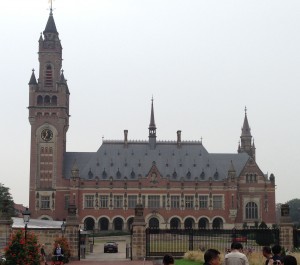 The International Court of Justice is one of three principal organs of the United Nations together with the General Assembly and the Security Council. It is located in the city of The Hague, Netherlands, and sits within the Peace Palace along with the Permanent Court of Arbitration. According to its website, “The Court’s role is to settle, in accordance with international law, legal disputes submitted to it by States and to give advisory opinions on legal questions referred to it by authorized United Nations organs and specialized agencies. The Court is composed of 15 judges who are elected for terms of office of nine years by the United Nations General Assembly and the Security Council. It is assisted by a Registry, its administrative organ. Its official languages are English and French.”
The International Court of Justice is one of three principal organs of the United Nations together with the General Assembly and the Security Council. It is located in the city of The Hague, Netherlands, and sits within the Peace Palace along with the Permanent Court of Arbitration. According to its website, “The Court’s role is to settle, in accordance with international law, legal disputes submitted to it by States and to give advisory opinions on legal questions referred to it by authorized United Nations organs and specialized agencies. The Court is composed of 15 judges who are elected for terms of office of nine years by the United Nations General Assembly and the Security Council. It is assisted by a Registry, its administrative organ. Its official languages are English and French.”
Only States, which are independent countries, can initiate legal proceedings against other States for violations of international law. The ICJ, however, is also open for States which are not members of the United Nations. Switzerland did not become a member of the United Nations until 2002 but initiated legal proceedings with the ICJ in 1957 as a non-Member State against the United States of America. The case lasted for 2 years and final judgment was entered on March 21, 1959 in favor of the United States, whereby the subject of the international dispute, being a Swiss corporation, has not exhausted its local remedies against the United States, therefore making the complaint against the United States premature.
If a private individual or group attempts to file an Application Instituting Proceedings against a State with the ICJ, the Registrar does not acknowledge receipt of the Application, but rather sends a template letter, either by mail or email, that states:
Dear ___,
In reply to your email or mail, I have to inform you that the International Court of Justice is not authorized, in view of its functions strictly defined by its Statute (Article 34) and Rules, to give advice or make observations on questions such as those raised in your communication.
The Court’s activities are limited to rendering judgments in legal disputes between States submitted to it by the States themselves and giving advisory opinions when it is so requested by UN organs or specialized agencies of the UN system.
It follows that neither the Court nor its Members can consider applications from private individual or groups, provide them with legal advice or assist them in their relations with the authorities of any country.
That being so, you will, I am sure, understand that, to my regret, no action can be taken on your communication.
Yours faithfully,
Département de l’information | Information Department – Cour internationale de Justice | International Court of Justice
 The Registrar of the ICJ, Philippe Couvreur, serves in similar fashion to a Clerk of a Court that receives and file stamps civil and criminal complaints. The Registrar’s duty is to ensure that the party filing an Application (Complaint) is a State, whether a member or non-member of the United Nations, and that it meets the compliance provided for in the Statute and Rules of the ICJ. Once it meets the requirements and before it is submitted to the Judges, the Application must be translated by the Registrar’s office into both the English and French languages, a bilingual version of the State’s Application must be printed and a copy sent to the Secretary General of the United Nations and other States who have access to the ICJ, the case must be listed on the ICJ General List, and a press release must be sent to the media announcing the filing of the Application.
The Registrar of the ICJ, Philippe Couvreur, serves in similar fashion to a Clerk of a Court that receives and file stamps civil and criminal complaints. The Registrar’s duty is to ensure that the party filing an Application (Complaint) is a State, whether a member or non-member of the United Nations, and that it meets the compliance provided for in the Statute and Rules of the ICJ. Once it meets the requirements and before it is submitted to the Judges, the Application must be translated by the Registrar’s office into both the English and French languages, a bilingual version of the State’s Application must be printed and a copy sent to the Secretary General of the United Nations and other States who have access to the ICJ, the case must be listed on the ICJ General List, and a press release must be sent to the media announcing the filing of the Application.
In order for the Registrar to complete these tasks he has a staff that includes a Deputy Registrar, a Legal Matters Department, a Linguistic Matters Department, an Information Department and 5 Technical Divisions comprised of Finance, Publications, Information and Communications Technology, Archives-Indexing and Distribution, and Text Processing and Reproduction. The funding of the ICJ is a portion drawn from the Regular Budget of the United Nations. The 2013 Regular Budget of the United Nations was $5.2 billion US dollars, and the proportionate budget for the ICJ was $47.7 million US dollars, which pays for these tasks to be completed by the Registrar’s office before the Court can take any action. If the State is a non-Member of the United Nations, it would have to contribute to cover the expenses of the Registrar’s office and Judges before the Court can taken any action. Article 35, paragraph 3 of the Statute of the ICJ states “When a state which is not a Member of the United Nations is a party to a case, the Court shall fix the amount which that party is to contribute towards the expenses of the Court. This provision shall not apply if such state is bearing a share of the expenses of the Court.”
On September 25, 2013, the Hawaiian Kingdom submitted to the Registrar of the International Court of Justice an “Application Instituting Proceedings” against 45 States for treaty violations and violations of international law. In addition, a “Request for the Indication of Provisional Measures of Protection” was also submitted requesting the Court to issue an order compelling the 45 States named in the complaint to no longer recognize the United States presence in Hawai‘i as legal. The Hawaiian Kingdom had previously deposited its declaration accepting jurisdiction of the International Court of Justice with the Secretary General of the United Nations on September 6, 2013 in accordance with Article 36 of the Statute of the Court.
The Registrar’s office was very reluctant to acknowledge receipt of the Hawaiian Kingdom’s Application because it was under the assumption that the Hawaiian Kingdom was not an independent State but rather a part of the United States of America. In fact, it received the template letter from the ICJ before the Agent for the Hawaiian Kingdom, Dr. David Keanu Sai, departed for the Netherlands to file the Application. While at The Hague, however, events transpired at the Peace Palace whereby the Registrar’s office was unable to deny the Hawaiian Kingdom’s status as a State and the Application was accepted by the personal assistant to the Registrar of the ICJ.
As a non-Member State of the United Nations, the Hawaiian Kingdom is responsible for covering the expenses of the Court as required under Article 35 of the Statute and, without providing its share to cover these costs, the Registrar’s office would not be able translate the Application into the French language and print out a bilingual version of the Application for the other States named in the Application, the Judges of the ICJ and the Secretary General of the United Nations. In other words, the Court cannot take any action on the case until the matter of costs is settled.
In order to address these costs, the Hawaiian Kingdom submitted a formal request on October 16, 2013 to have the President of the International Court of Justice convene the other Judges of the Court to fix the amount, which the Hawaiian Kingdom is to contribute towards the expenses of the Court. The paradox to this request is that for the President to convene the Court in order to determine the amount the Hawaiian Kingdom is to contribute, there would be an expense for the Court to convene which the Hawaiian Kingdom was to pay beforehand.
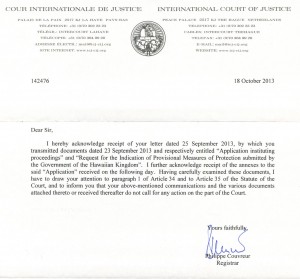 In a letter to the Hawaiian Kingdom from the International Court of Justice dated October 18, 2013, the Registrar formally acknowledged receipt of the Hawaiian Kingdom’s Application and Request for Interim Measures of Protection but stated the Court cannot take action at this time. In the letter, the Registrar alluded to this paradox by stating the Court can take no action and made specific reference to Article 35, which addresses the costs that must be paid by the Hawaiian Kingdom first. The last sentence of Article 35, paragraph 3, states the Court would not have to convene if the Hawaiian Kingdom provided its share to cover the expenses of the Court.
In a letter to the Hawaiian Kingdom from the International Court of Justice dated October 18, 2013, the Registrar formally acknowledged receipt of the Hawaiian Kingdom’s Application and Request for Interim Measures of Protection but stated the Court cannot take action at this time. In the letter, the Registrar alluded to this paradox by stating the Court can take no action and made specific reference to Article 35, which addresses the costs that must be paid by the Hawaiian Kingdom first. The last sentence of Article 35, paragraph 3, states the Court would not have to convene if the Hawaiian Kingdom provided its share to cover the expenses of the Court.
On September 28, 2013, the Hawaiian Kingdom provided a cashier’s check made out to the International Court of Justice to cover the expenses of the Court in the Hawaiian case. The Hawaiian Kingdom arrived at this amount by following the calculations used by the United Nations for member States to contribute their share to the 2013 Regular Budget, which included the proportionate share to the International Court of Justice.
After further thought on the matter, the Hawaiian Kingdom concluded that the United States of America has already paid its share to the Court for 2013. The United Nations measurement of costs incurred by member States is based on the country’s gross national income (GNI), which is also called the gross nation product (GNP). The United States has unlawfully seized control of the Hawaiian GNI and a large portion of the United States revenue derives from Internal Revenue Service (IRS) taxes. In 2012, the IRS collected $2.2 trillion dollars, of which residents and businesses in the Hawaiian Islands paid $5.1 billion dollars. As an occupier, the United States cannot collect taxes in a foreign country for its own benefit, and if it does it is called plundering. Unlawful appropriation of private property is plundering and extensive appropriation of property, not justified by military necessity and carried out unlawfully and wantonly, is a war crime. In other words, the United States’ contribution of $618.5 million made to the United Nations 2013 Regular Budget, of which $5.7 million went to the International Court of Justice, is tainted with stolen property from the residents of an illegally occupied State.
On November 4, 2013, the Hawaiian Kingdom notified the Registrar of the severity of the situation. In its notice to the Registrar, the Hawaiian Kingdom stated that due to the “inability at the moment to have access to verifiable data and sources to arrive at a specific amount it could claim from the United States contribution to the International Court of Justice of its proportionate share pursuant to Article 35, the Hawaiian Kingdom requests Your Excellency to assess from the United States’ contribution of $5,710,018.66, which the Court has already received, and determine with verifiable data the specific amount of illegally appropriated monies derived from the territory of the Hawaiian Kingdom and to place that entire amount in an interest bearing account under the International Court of Justice for reparations that the Hawaiian Kingdom seeks as provided in paragraph 4(l) of its Application.” The Hawaiian Kingdom maintained that the contribution it provided to the Court on September 28 should cover the expenses required by Article 35 of the Statute.
In 1995, the dominant view of sovereignty was centered on ethnicity—the aboriginal (native) Hawaiian, and, as a people, its endeavor was to achieve either sovereignty through independence or a limited sovereignty within the United States. In other words, sovereignty was not a reality vested in an already established independent State as we now understand the term, but rather it was perceived as a political aspiration of a native people seeking sovereignty, thus giving rise to a sovereignty movement where you have some groups advocating for independence from the United States, while other groups advocating for limited sovereignty under United States law. The United States 1993 Congressional Apology Resolution for the overthrow of the Hawaiian Kingdom government merely reinforced this view and portrayed native Hawaiians as a group similar to Native Americans. This was not an accurate portrayal of Hawai‘i’s political and legal history.
According to the government census in 1890, the majority of the Hawaiian Kingdom’s citizenry were aboriginal Hawaiians at 86% and the remaining 14% were non-aboriginal. The Hawaiian Kingdom was not based on ethnicity, but rather the rule of law, and the citizenry was also opened through naturallization and denization or through birth on Hawaiian territory – natural born. The international law of occupation, however, prevents the acquisition of the citizenship of the Hawaiian Kingdom through birth on Hawaiian territory, and limits the acquisition of Hawaiian citizenship to parentage. In other words, the citizenry of the Hawaiian Kingdom today is limited to people who are direct descendants of Hawaiian subjects, irrespective of their race, color or creed, that were Hawaiian subjects on August 12, 1898, which was the beginning of the prolonged occupation.
Already armed with the knowledge that the Hawaiian Kingdom was a recognized State under international law since November 28, 1843, and that the unlawful overthrow of the Hawaiian government on January 17, 1893 by the United States did not equate to an overthrow of Hawaiian State sovereignty, extraordinary steps were taken in order to establish an acting government through a process provided for by Hawaiian Kingdom law as it existed in 1893, and by the legal doctrine of necessity. On December 15, 1995, a general partnership was formed under the 1880 Act to Provide for the Registration of Co-partnership Firms with the specific purpose to serve as an acting government in the absence of the monarch who was the chief executive of Hawaiian law and administration of government. A plan was devised to activate a regent under 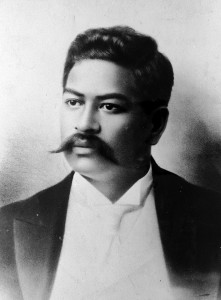 Article 33 of the Hawaiian Constitution to temporarily serve in the absence of a monarch, because to claim to be a monarch would be a direct violation of Hawaiian law. Since the death of Prince Kuhio Kalaniana‘ole in 1922, the last proclaimed heir to the throne prior to the illegal overthrow of the Hawaiian government, only the Legislative Assembly has the authority under Article 22 of the Hawaiian Constitution to elect by ballot a new monarch—any other claimant would be self-proclaimed. Lunalilo was elected King by the Legislative Assembly under Article 22 of the Constitution on January 8, 1873 because King Kamehameha V was not able to confirm an heir under Hawaiian law, and the following year, David Kalakaua was elected King under Article 22 because King Lunalilo was not able to confirm an heir as well. A regency was the only legal option to reactivate the government.
Article 33 of the Hawaiian Constitution to temporarily serve in the absence of a monarch, because to claim to be a monarch would be a direct violation of Hawaiian law. Since the death of Prince Kuhio Kalaniana‘ole in 1922, the last proclaimed heir to the throne prior to the illegal overthrow of the Hawaiian government, only the Legislative Assembly has the authority under Article 22 of the Hawaiian Constitution to elect by ballot a new monarch—any other claimant would be self-proclaimed. Lunalilo was elected King by the Legislative Assembly under Article 22 of the Constitution on January 8, 1873 because King Kamehameha V was not able to confirm an heir under Hawaiian law, and the following year, David Kalakaua was elected King under Article 22 because King Lunalilo was not able to confirm an heir as well. A regency was the only legal option to reactivate the government.
According to the Co-partnership Act, Hawaiian Kingdom law required partnership agreements to be recorded in the Bureau of Conveyances as part of the registration process with the Minister of Interior. Today, the Bureau of Conveyances still exists and you will find partnership agreements that have been registered since 1880 to 1893. In fact, the State of Hawai‘i governmental infrastructure is the governmental infrastructure of the Hawaiian Kingdom. All that was changed since 1893 were the titles and additional departments, i.e. Monarch to Governor, Governors to Mayors, Department of Interior to Department of Land and Natural Resources, Department of Finance to Department of Accounting and General Services, Department of Education remained, Attorney General remained, Judicial Circuits remained, etc.
In its co-partnership agreement establishing the Hawaiian Kingdom Trust Company, which was recorded in the Bureau of Conveyances and assigned document no. 96-000263, the partnership agreement specifically states the “company will serve in the capacity of acting for and on behalf the Hawaiian Kingdom government.” It also provided that the “company has adopted the Hawaiian constitution of 1864 and the laws lawfully established in the administration of the same.” The Hawaiian Kingdom Trust Company was specifically established to regulate and ensure that Perfect Title Company, another co-partnership established on December 10, 1995, comply with the Co-partnership Act and Hawaiian Kingdom law.
The acting government was not established by virtue of Hawaiian Kingdom law, but rather by virtue of the legal doctrine of necessity though the use and application of Hawaiian Kingdom law. As in any constitutional government, there is an organizational infrastructure established under the constitution and laws that provides for its effective administration. Within this infrastructure, co-partnerships come under the direct supervision of the office of the Minister of the Interior; the Minister of the Interior sits on the Cabinet Council comprised of the Minister of Finance, the Minister of Foreign Affairs, and the Attorney General; and the Cabinet Council serves as a Council of Regency who serves in the absence of a monarch according to Article 33 of the Hawaiian constitution.
In the absence of individuals occupying these offices established by Hawaiian law since January 17, 1893, the Trustees of the Hawaiian Kingdom Trust Company took the necessary steps, under extraordinary circumstances and under the doctrine of necessity, to assume the offices directly in line from a co-partnership through the Minister of the Interior to the Council of Regency. This is analogous to a soldier with the rank of Private assuming the chain of command to Lieutenant, because everyone within the chain of command from Corporal to Sergeant to Staff Sergeant to Lieutenant were killed in action. Under Army regulations the most senior Private is obligated to assume the chain of command and is called acting Lieutenant in order to maintain the command structure. He remains the acting Lieutenant until a properly commissioned officer relieves him and then he returns to his original position as Private.
For a private company to assume the role of government is revolutionary, but in order for this action to not be considered treason, the doctrine of necessity can be used to justify the assumption of government. According to Professor de Smith in his book Constitutional and Administrative Law, deviations from a State’s constitutional order “can be justified on grounds of necessity.” He argues, “State necessity has been judicially accepted in recent years as a legal justification for ostensibly unconstitutional action to fill a vacuum arising within the constitutional order [and to] this extent it has been recognized as an implied exception to the letter of the constitution.” In 1986, the Court of Appeals of Grenada in Mitchell v. Director of Public Prosecutions, addressed the doctrine of necessity and provided the following conditions that would justify an action to assume the role of government.
On March 1, 1996, the Trustees appointed David Keanu Sai, who later received his Ph.D. in 2008, to serve in the capacity as acting Regent to head the government. Dr. Sai is also the maternal great grandson of William Kuakini Simerson and the paternal great great grandson of Julia Kapapakuialii Kalaninuipoaimoku, both of whom who was confirmed by the Hawaiian Board of Genealogists of Hawaiian Chiefs to be “native chiefs” in conformity with the 1880 Act to Perpetuate the Genealogy of the Chiefs of Hawai‘i. The purpose of enacting the statute was provided in its preamble, which states:
The Board of Genealogy of Hawaiian Chiefs was established by law to “collect from genealogical books, and from the knowledge of old people the history and genealogy of  the Hawaiian chiefs, and shall publish a book.” As a result of the illegal overthrow of the Hawaiian government, however, the Board published the genealogies of native chiefs living at the time between April 20 and November 30, 1896 in the newspaper publication Ka Maka‘ainana.
the Hawaiian chiefs, and shall publish a book.” As a result of the illegal overthrow of the Hawaiian government, however, the Board published the genealogies of native chiefs living at the time between April 20 and November 30, 1896 in the newspaper publication Ka Maka‘ainana.
After assuming the role of government, the acting Regency had to display some form of legal effects, which is a crucial element of legitimacy. In order for a government to be legitimate, it has to be effective both within its territory to enforce its laws and outside of its territory to enforce international law. An exception to the principle of effectiveness is the occupation by another State’s forces. According to Professor Marek in her book Identity and Continuity of States in Public International Law, “the legal order of the occupant (State) is…strictly subject to the principle of effectiveness, while the legal order of the occupied State continues to exist [despite] the absence of effectiveness. It can produce legal effects outside the occupied territory and may develop and expand, not by reason of its effectiveness, but solely on the basis of the positive international rule safeguarding its continuity.”
The first instance of exhibiting legal effects outside the occupied territory occurred when the acting government entered into an arbitration agreement with Lance Larsen, a Hawaiian national, to submit their dispute to the Permanent Court of Arbitration in The Hague, Netherlands. In 2001, the American Journal of International Law reported:
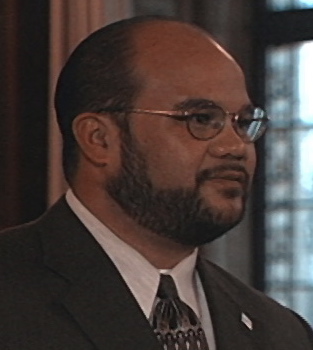 The arbitral proceedings led to the United States de facto recognition of the continuity of the Hawaiian Kingdom as an independent State, and the acting government as officers de facto of the Hawaiian Kingdom. In February 2000, the Permanent Court of Arbitration’s Secretary General Tjaco T. van den Hout recommended that the acting government provide a formal invitation to the United States to join in the arbitration. In order to carry out this request by the Secretary General, Dr. Sai was sent to Washington, D.C. Ms. Ninia Parks, attorney for the Claimant Lance Larsen, accompanied Dr. Sai.
The arbitral proceedings led to the United States de facto recognition of the continuity of the Hawaiian Kingdom as an independent State, and the acting government as officers de facto of the Hawaiian Kingdom. In February 2000, the Permanent Court of Arbitration’s Secretary General Tjaco T. van den Hout recommended that the acting government provide a formal invitation to the United States to join in the arbitration. In order to carry out this request by the Secretary General, Dr. Sai was sent to Washington, D.C. Ms. Ninia Parks, attorney for the Claimant Lance Larsen, accompanied Dr. Sai.  On March 3, 2000, a telephone meeting with John R. Crook, Assistant Legal Adviser for United Nations Affairs section of the US Department of State, was held. It was stated to Mr. Crook that the “visit was to provide these documents to the Legal Department of the U.S. Department of State in order for the U.S. Government to be apprised of the arbitral proceedings already in train and that the Hawaiian Kingdom, by consent of the Claimant, extends an opportunity for the United States to join in the arbitration as a party.”
On March 3, 2000, a telephone meeting with John R. Crook, Assistant Legal Adviser for United Nations Affairs section of the US Department of State, was held. It was stated to Mr. Crook that the “visit was to provide these documents to the Legal Department of the U.S. Department of State in order for the U.S. Government to be apprised of the arbitral proceedings already in train and that the Hawaiian Kingdom, by consent of the Claimant, extends an opportunity for the United States to join in the arbitration as a party.”
Mr. Crook was made fully aware of the United States occupation of the Hawaiian Kingdom and the establishment of the acting government. This direct challenge to US sovereignty over the Hawaiian Islands should have prompted the United States to protest the action taken by the Permanent Court of Arbitration in accepting the Hawaiian arbitration case and call upon the Secretary General to cease and desist because this action constitutes a violation of US sovereignty. The United States did neither. Instead, Deputy Secretary General Phyllis Hamilton notified the acting government that the United States notified the Court that it will not join in the arbitration, but did request from the acting government permission to access all pleadings and transcripts of the case. Both the acting government and Larsen’s attorney consented. By this action, the United States directly acknowledged the circumstances of the proceedings and the acting government as the legitimate representation of the Hawaiian Kingdom before an international tribunal.
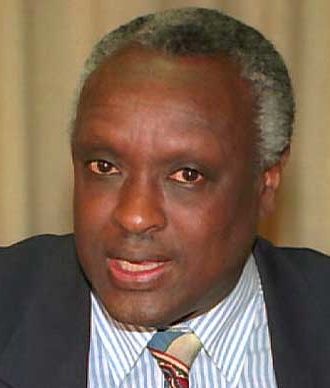 On December 12, 2000, the day after oral hearings were held at the Permanent Court of Arbitration, a meeting took place in Brussels between Dr. Jacques Bihozagara, Ambassador for the Republic of Rwanda assigned to Belgium, and the acting government. The meeting was prompted by Ambassador Bihozagara who called the acting government at its hotel in The Hague, after the Ambassador was apprised of the arbitration proceedings while he was attending a hearing at the International Court of Justice on December 8, 2000, Democratic Republic of the Congo v. Belgium. At the meeting in Brussels, the Rwandan government directly acknowledged the acting government and offered their assistance in reporting to the United Nations General Assembly the prolonged occupation of the Hawaiian Kingdom. In that meeting, the acting government decided it could not, in good conscience, accept the offer and place Rwanda in a position of reintroducing Hawaiian State continuity before the United Nations, when Hawai‘i’s community, itself, remained ignorant of Hawai‘i’s profound legal position as a result of institutionalized indoctrination. Although the Rwandan government took no action before the United Nations General Assembly, the offer itself, exhibited Rwanda’s de facto recognition of the acting government and the continuity of the Hawaiian State.
On December 12, 2000, the day after oral hearings were held at the Permanent Court of Arbitration, a meeting took place in Brussels between Dr. Jacques Bihozagara, Ambassador for the Republic of Rwanda assigned to Belgium, and the acting government. The meeting was prompted by Ambassador Bihozagara who called the acting government at its hotel in The Hague, after the Ambassador was apprised of the arbitration proceedings while he was attending a hearing at the International Court of Justice on December 8, 2000, Democratic Republic of the Congo v. Belgium. At the meeting in Brussels, the Rwandan government directly acknowledged the acting government and offered their assistance in reporting to the United Nations General Assembly the prolonged occupation of the Hawaiian Kingdom. In that meeting, the acting government decided it could not, in good conscience, accept the offer and place Rwanda in a position of reintroducing Hawaiian State continuity before the United Nations, when Hawai‘i’s community, itself, remained ignorant of Hawai‘i’s profound legal position as a result of institutionalized indoctrination. Although the Rwandan government took no action before the United Nations General Assembly, the offer itself, exhibited Rwanda’s de facto recognition of the acting government and the continuity of the Hawaiian State.
Other examples of creating legal effects on the international plane include:
The acting government, as nationals of an occupied State, took the necessary and extraordinary steps, by necessity and according to the laws of the Hawaiian Kingdom and international law, to reestablish the Hawaiian government in an acting capacity in order to exercise our country’s preeminent right to “self-preservation” that was deprived through fraud and deceit; and for the past 13 years the acting government has acquired a customary right under international law in representing the Hawaiian State during this prolonged and illegal occupation.
For a detailed legal brief download “The Continuity of the Hawaiian State and the Legitimacy of the acting Government of the Hawaiian Kingdom.”
Since the first constitution was promulgated by King Kamehameha III in 1840, constitutionalism had begun in the Hawaiian Islands. For the next 24 years, Hawaiian governance would be transformed from an absolute monarchy to a limited monarchy under the separation of powers doctrine under the headings of Executive power, Legislative power and Judicial power. This cornerstone of constitutionalism was eventually enshrined in the 1864 constitution.
In 1893, Queen Lili‘uokalani was constitutionally vested with the Executive power under Article 31, which is the power to execute laws enacted by the Legislature, which included the Civil and Criminal Codes, and to enforce judicial decisions made by the Courts. This 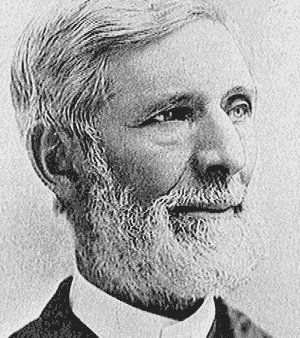 authority, however, was interrupted when United States troops were unlawfully landed by order of the United States Minister John Stevens on January 16, 1893, in order to protect insurgents who, as part of a prearranged plan, would declare themselves to be a provisional government until annexation to the United States can be accomplished by a treaty of cession.
authority, however, was interrupted when United States troops were unlawfully landed by order of the United States Minister John Stevens on January 16, 1893, in order to protect insurgents who, as part of a prearranged plan, would declare themselves to be a provisional government until annexation to the United States can be accomplished by a treaty of cession.
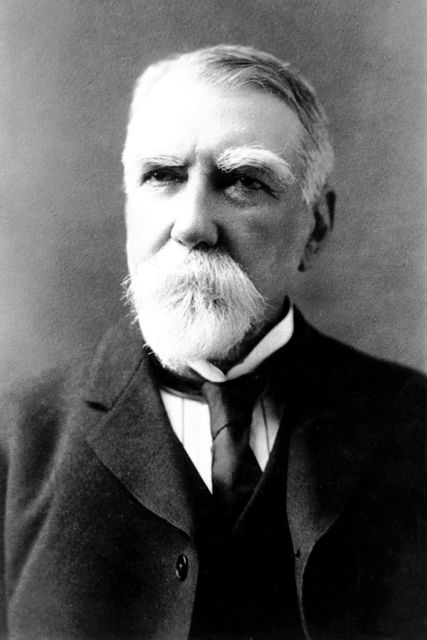 Over the protests by Oahu Governor Archibald Cleghorn and the Minister of Foreign Affairs Samuel Parker, the US troops were fully
Over the protests by Oahu Governor Archibald Cleghorn and the Minister of Foreign Affairs Samuel Parker, the US troops were fully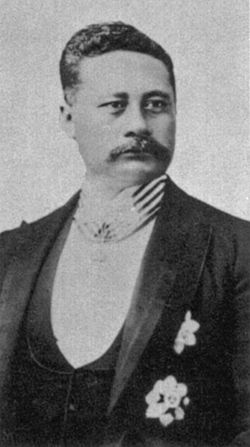 armed and occupied a small space between two buildings adjacent to the Government building on Mililani Street and fronting Iolani Palace, which was across King Street. If the police moved in to apprehend the insurgents for committing the capital crime of treason they would have to first deal with the US troops who were prepared for a fight. This situation quickly escalated from a domestic police matter to now an international incident that could spark a war between the Hawaiian Kingdom and the United States. Upon the sound advice of her advisors, Queen Lili‘uokalani provided the following protest.
armed and occupied a small space between two buildings adjacent to the Government building on Mililani Street and fronting Iolani Palace, which was across King Street. If the police moved in to apprehend the insurgents for committing the capital crime of treason they would have to first deal with the US troops who were prepared for a fight. This situation quickly escalated from a domestic police matter to now an international incident that could spark a war between the Hawaiian Kingdom and the United States. Upon the sound advice of her advisors, Queen Lili‘uokalani provided the following protest.
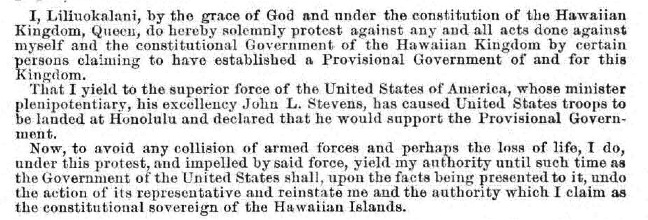 The yielding of her power to enforce the law was limited to the the Queen’s constitutional authority enumerated under Article 31 of the Hawaiian constitution. It was not a transfer of the sovereignty of the country, and it was limited and confined to the circumstances of the invasion by US troops to aid and protect insurgents from arrest by the police force. It was made with the understanding of the Hawaiian government that the President would investigate the circumstances and restore the government.
The yielding of her power to enforce the law was limited to the the Queen’s constitutional authority enumerated under Article 31 of the Hawaiian constitution. It was not a transfer of the sovereignty of the country, and it was limited and confined to the circumstances of the invasion by US troops to aid and protect insurgents from arrest by the police force. It was made with the understanding of the Hawaiian government that the President would investigate the circumstances and restore the government.
If the United States was in complete control of Hawaiian territory as an occupying force it would, by circumstance, be vested with authority to enforce Hawaiian law under the international laws of occupation, and would not need the Queen to have temporarily assigned her power to enforce Hawaiian law to make it valid. But this was not the case. 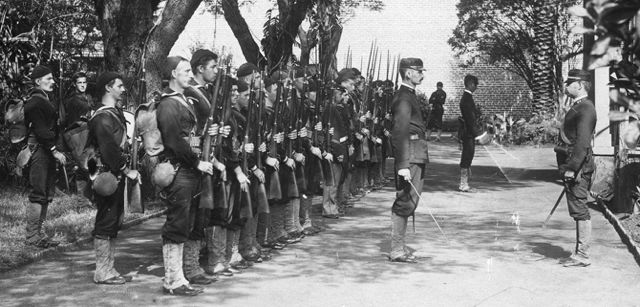 The US troops were illegally landed on January 16, 1893 and maintained a defensive position limited to a small space between two buildings called Opera House and Arion Hall that was situated on Mililani Street adjacent to the Government building. On January 31, 1893, lead insurgent Sanford Dole of the provisional government was concerned for their safety and requested US Minister Stevens for protection. Dole stated, “Believing that we are unable to satisfactory protect life and property, and to prevent civil disorders in Honolulu and throughout the Hawaiian Islands, we hereby, in obedience to the instructions of the advisory council, pray that you will raise the flag of the United States of America for the protection of the Hawaiian Islands for the time being.” The following day on February 1, 1893, US Minister Stevens directed Captain Wiltse of the USS Boston to comply with the request and take the necessary steps to establish a US protectorate.
The US troops were illegally landed on January 16, 1893 and maintained a defensive position limited to a small space between two buildings called Opera House and Arion Hall that was situated on Mililani Street adjacent to the Government building. On January 31, 1893, lead insurgent Sanford Dole of the provisional government was concerned for their safety and requested US Minister Stevens for protection. Dole stated, “Believing that we are unable to satisfactory protect life and property, and to prevent civil disorders in Honolulu and throughout the Hawaiian Islands, we hereby, in obedience to the instructions of the advisory council, pray that you will raise the flag of the United States of America for the protection of the Hawaiian Islands for the time being.” The following day on February 1, 1893, US Minister Stevens directed Captain Wiltse of the USS Boston to comply with the request and take the necessary steps to establish a US protectorate.
On March 9, 1893, President Cleveland acknowledged receipt of the temporary assignment and thereafter took the necessary steps to investigate the overthrow by appointing James Blount as special commissioner on March 11, 1893. The protectorate status was terminated when US Special Commissioner Blount arrived in Honolulu on March 29, 1893 and began his investigation by direction of President Cleveland. Blount sent periodic reports to Secretary of State Walter Gresham in Washington, D.C., with his final report submitted on July 17, 1893.
The investigation was completed on October 18, 1893, where Secretary of State Gresham stated to the President, “The Government of Hawaii surrendered its authority under a threat of war, until such time only as the Government of the United States, upon the facts being presented to it, should reinstate the constitutional sovereign.” Gresham concluded in his report to the President, “Should not the great wrong done to a feeble but independent State by an abuse of the authority of the United States be undone by restoring the legitimate government? Anything short of that will not, I respectfully submit, satisfy the demands of justice.” The President agreed and directed the new US Minister Albert Willis to negotiate with the Queen for restoration of the government, which led to the executive agreement of restoration on December 18, 1893. Because the Agreement of restoration has not been carried out since, the United States is still bound to administer Hawaiian law under the Lili‘uokalani assignment as well as the international laws of occupation.
THE HAGUE, NETHERLANDS, 27 September 2013 — The acting Government of the Hawaiian Kingdom filed with the Registrar of the International Court of Justice an Application Instituting Proceedings against the Republic of Austria, Barbados, the Kingdom 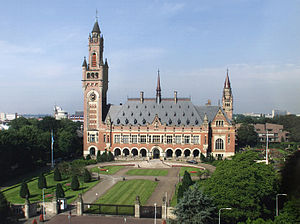 of Belgium, the Republic of Botswana, the Republic of Bulgaria, the Republic of Costa Rica, the Republic of Côte d’Ivoire, Democratic Republic of the Congo, the Kingdom of Denmark, the Republic of Djibouti, the Commonwealth of Dominica, the Dominican Republic, the Arab Republic of Egypt, the Republic of Finland, Gambia, Georgia, the Hellenic Republic of Greece, the Republic of Guinea, the Republic of Guinea-Bissau, the Republic of Haiti, the Republic of Honduras, the Republic of Ireland, the Republic of Kenya, the Kingdom of Lesotho, the Republic of Liberia, the Grand Duchy of Luxembourg, the Republic of Madagascar, the Republic of Malawi, the Republic of the Marshall Islands, the United Mexican States, the Kingdom of the Netherlands, the Kingdom of Norway, the Islamic Republic of Pakistan, the Republic of Paraguay, the Republic of Peru, the Republic of Senegal, the Republic of South Sudan, the Republic of Suriname, the Kingdom of Swaziland, the Kingdom of Sweden, the Swiss Confederation, the Democratic Republic of Timor-Leste, the Togolese Republic, the Republic of Uganda, and the Oriental Republic of Uruguay for treaty violations and serious breaches of peremptory norms. Austria, Belgium, Denmark, Netherlands, Norway, Sweden, and Switzerland have treaties with the Hawaiian Kingdom. All (45) States have accepted the jurisdiction of the Court beforehand, including the Hawaiian Kingdom.
of Belgium, the Republic of Botswana, the Republic of Bulgaria, the Republic of Costa Rica, the Republic of Côte d’Ivoire, Democratic Republic of the Congo, the Kingdom of Denmark, the Republic of Djibouti, the Commonwealth of Dominica, the Dominican Republic, the Arab Republic of Egypt, the Republic of Finland, Gambia, Georgia, the Hellenic Republic of Greece, the Republic of Guinea, the Republic of Guinea-Bissau, the Republic of Haiti, the Republic of Honduras, the Republic of Ireland, the Republic of Kenya, the Kingdom of Lesotho, the Republic of Liberia, the Grand Duchy of Luxembourg, the Republic of Madagascar, the Republic of Malawi, the Republic of the Marshall Islands, the United Mexican States, the Kingdom of the Netherlands, the Kingdom of Norway, the Islamic Republic of Pakistan, the Republic of Paraguay, the Republic of Peru, the Republic of Senegal, the Republic of South Sudan, the Republic of Suriname, the Kingdom of Swaziland, the Kingdom of Sweden, the Swiss Confederation, the Democratic Republic of Timor-Leste, the Togolese Republic, the Republic of Uganda, and the Oriental Republic of Uruguay for treaty violations and serious breaches of peremptory norms. Austria, Belgium, Denmark, Netherlands, Norway, Sweden, and Switzerland have treaties with the Hawaiian Kingdom. All (45) States have accepted the jurisdiction of the Court beforehand, including the Hawaiian Kingdom.
The filing of the Application is directly tied to the Hawaiian Kingdom’s Protest and Demand filed with the President of the United Nations General Assembly on August 10, 2012. The Application is seeking enforcement of the Hawaiian Kingdom’s Demand that States comply with their treaty obligations and obligations under customary international law.
Also submitted with the Application was a Request for the Indication of Provisional Measures of Protection. The request states the “fact that serious breaches of rules of jus cogens have been ongoing for over a century only amplifies the urgent request that the Court indicate provisional measures to protect and preserve the rights of the Hawaiian Kingdom.” The Court is requested to declare that:
a) All member States of the United Nations, which includes the States herein named, in compliance with the duty of non-recognition imposed under Articles 41(1) and 41(2) of the Articles of State Responsibility for International Wrongful Acts, are under an obligation:
1) to recognize the illegality and invalidity of the United States of America’s continued presence in the Hawaiian Kingdom;
2) to refrain from lending any support or any form of assistance to the United States of America with reference to its illegal occupation of the Hawaiian Kingdom;
3) to abstain from entering into treaty relations with the United States of America in all cases whereby the government of the United States of America purports to act on behalf of or concerning the Hawaiian Kingdom;
4) to abstain from sending consular agents to the territory of the Hawaiian Kingdom, purportedly under arrangements and/or agreements with the United States of America, and to withdraw any such agents already there;
5) to abstain from entering into economic, military and any other form of relationship or dealing with the United States of America on behalf of or concerning the Hawaiian Kingdom, which may entrench its authority over the territory;
b) With respect to existing bilateral treaties, member States of the United Nations, which includes the States herein named, in compliance with the duty of non-recognition imposed under Articles 41(1) and 41(2) of the Articles of State Responsibility for International Wrongful Acts, must abstain from invoking or applying those treaties or provisions of treaties concluded by the United States of America on behalf of or concerning the Hawaiian Kingdom, which include and/or involve active intergovernmental co-operation.
c) With respect to multilateral treaties, however, the same rule cannot be applied to certain general conventions such as those of a humanitarian character, the non-performance of which may adversely affect the people of the Hawaiian Kingdom;
d) All member States of the United Nations, which includes the States herein named, in compliance with the duty of non-recognition imposed under Articles 41(1) and 41(2) of the Articles of State Responsibility for International Wrongful Acts, should not result in depriving the people of the Hawaiian Kingdom of any advantages derived from international co-operation. In particular, while official acts performed by the Government of the United States of America on behalf of or concerning the Hawaiian Kingdom since the occupation began on 12 August 1898 are illegal and invalid, this invalidity cannot be extended to those acts, such as, for instance, the registration of births, deaths and marriages, the effects of which can be ignored only to the detriment of the inhabitants of the Territory.
e) With respect to non-member States of the United Nations, the illegality of the United States of America’s presence in the Hawaiian Kingdom is opposable to all States in the sense of barring erga omnes the legality of a situation which is maintained in violation of international law: in particular, no State which enters into relations with the United States of America concerning the Hawaiian Kingdom may expect the United Nations or its Members to recognize the validity or effects of such relationship, or of the consequences thereof.
The acting Government of the Hawaiian Kingdom designated David Keanu Sai, Ph.D., its Ambassador-at-large, as Agent for these proceedings, and Dexter Ke‘eaumoku Ka‘iama, Esq., its Attorney General, as Deputy Agent. Dr. Sai served as lead Agent for the Hawaiian Kingdom in Larsen v. Hawaiian Kingdom (1999-2001) and presented oral arguments at the Peace Palace on December 7, 8, and 11, 2000. Members of the arbitral tribunal included Professor James Crawford, SC, as presiding arbitrator, with Mr. Gavan Griffith, QC, and Professor Christopher Greenwood, QC, serving as associate arbitrators. Professor Greenwood is now a Judge of the International Court of Justice. Both the Permanent Court of Arbitration and the International Court of Justice are located in the Peace Palace, The Hague, Netherlands.
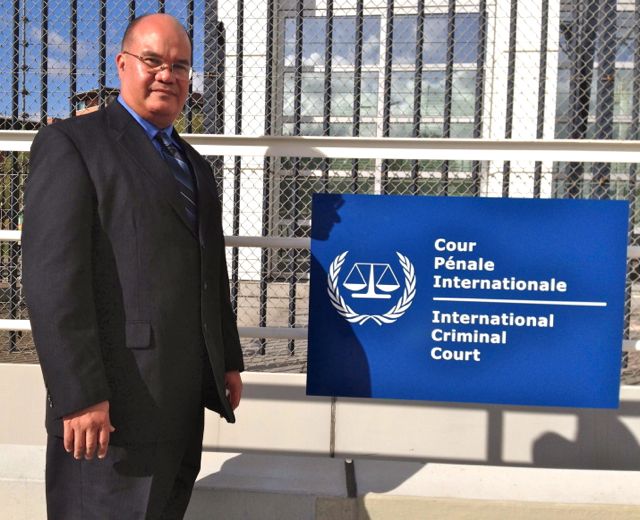 While in The Hague, Dr. Sai also met with a member of the International Criminal Court’s Information & Evidence Unit at the Court’s headquarters to inquire into the status of the Hawaiian Kingdom’s Referral to initiate an investigation for war crimes. He confirmed that it is still under review and that the Office of the Prosecutor will be in communication shortly.
While in The Hague, Dr. Sai also met with a member of the International Criminal Court’s Information & Evidence Unit at the Court’s headquarters to inquire into the status of the Hawaiian Kingdom’s Referral to initiate an investigation for war crimes. He confirmed that it is still under review and that the Office of the Prosecutor will be in communication shortly.
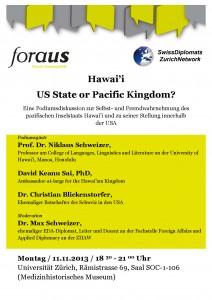 The Swiss Diplomats – Zurich Network has invited Dr. Keanu Sai to the city of Zurich to give a presentation on the prolonged and illegal occupation of the Hawaiian Kingdom. The title of Dr. Sai’s presentation is “Hawai‘i – An American State or a State Under American Occupation.” Professor Niklaus Schweizer, a former Swiss Consul for Hawai‘i and a professor at the University of Hawai‘i at Manoa, will be giving the introduction. After the presentation there will be a panel discussion comprised of Dr. Sai, Professor Schweizer, and former Swiss Ambassador to the United States and Germany, Dr. Christian Blickenstorfer. The presentation and panel is scheduled for Monday, November 11, 2013.
The Swiss Diplomats – Zurich Network has invited Dr. Keanu Sai to the city of Zurich to give a presentation on the prolonged and illegal occupation of the Hawaiian Kingdom. The title of Dr. Sai’s presentation is “Hawai‘i – An American State or a State Under American Occupation.” Professor Niklaus Schweizer, a former Swiss Consul for Hawai‘i and a professor at the University of Hawai‘i at Manoa, will be giving the introduction. After the presentation there will be a panel discussion comprised of Dr. Sai, Professor Schweizer, and former Swiss Ambassador to the United States and Germany, Dr. Christian Blickenstorfer. The presentation and panel is scheduled for Monday, November 11, 2013.
On July 20, 1864, the Hawaiian Kingdom entered into a Treaty of Friendship, Establishment and Commerce with Switzerland that established perpetual peace and reciprocal liberties. Article 1 states: “Hawaiians shall be received and treated in every canton of the Swiss Confederation, as regards their persons and their properties, on the same footing and in the same manner as now are or may hereafter be treated, the citizens of other cantons. The Swiss shall enjoy in the Hawaiian Islands all the same rights as Hawaiians in Switzerland.” The treaty was negotiated on behalf of the Hawaiian Kingdom by Sir John Bowring, who was a Knight Bachelor of Great Britain and Commander of the Order of Leopold of Belgium. The Hawaiian-Swiss Treaty has not been terminated by either the Hawaiian Kingdom or the Swiss Confederation.
The Diplomatic Network is aware of the Hawaiian-Swiss Treaty, the Hawaiian arbitration, Larsen v. Hawaiian Kingdom, at the Permanent Court of Arbitration at the Hague, Netherlands, from 1999-2001, the Hawaiian complaint filed with the United Nations Security Council in 2001, and the Hawaiian protest and demand filed with the United Nations General Assembly in 2012. Dr. Sai served as lead agent in the arbitration proceedings and the filings with the United Nations.
Yesterday, the German Federal Prosecutor received a war crime complaint filed by attorney Dexter Kaiama alleging the Management Board of Deutsche Bank, Judge Greg K. Nakamura, and Deutsche Bank attorneys Charles R. Prather, Sofia M. Hirosone, and Michael G.K. Wong committed criminal acts against his clients Mr. Kale Kepekaio Gumapac and Mr. Harris Bright, both being Hawaiian subjects and protected persons under the Fourth Geneva Convention, 1949. The basis of the complaint is Section 6(9) of the German Criminal Code, which authorizes the German government to prosecute crimes committed by a German abroad, the German Code of Crimes against International Law (CCAIL), and the 1879 Hawaiian-German Treaty of Friendship, Commerce and Navigation and Consular Convention. Deutsche Bank is a German financial institution headquartered in Frankfurt, Germany.
The complaint alleges that “Deutsche Bank, despite having no valid and legal interest in both of my clients’ property, has deliberately ignored pursuing its proper remedy for financial recovery, and instead, intentionally violated CCAIL (and international law) by initiating a fraudulent and unlawful court process to obtain unlawful orders to evict my clients from their property, thereby committing violations of the CCAIL.” In the complaint, it states that both clients mortgaged their properties that was eventually assigned to Deutsche Bank, but were unaware that their titles to their properties were defective as a direct result of the illegal overthrow of the Hawaiian government by the United States in 1893 and the United States subsequent illegal and prolonged occupation.
Laulima Title Search and Claims, LLC, a company owned by Gumapac, was contracted to investigate the title to both properties and determined “This claim involves a defect of title by virtue of an executive agreement entered into between President Grover Cleveland of the United States and Queen Lili‘uokalani of the Hawaiian Kingdom, whereby the President and his successors in office were and continue to be bound to faithfully execute Hawaiian Kingdom law by assignment of the Queen under threat of war on January 17th 1893. The notaries public in the Hawaiian Islands and the registrar of the Bureau of Conveyances were not lawful since January 17th 1893, and therefore title to the estate in fee-simple” defective, “because…the deed of conveyance was not lawfully executed in compliance with Hawaiian Kingdom law.”
Since a mortgage is a lien on the title to the property, a defect in title would consequently render the lien invalid, which would also invalidate any foreclosure and ejectment proceedings stemming from the mortgage. In order for lenders to protect themselves from this type of situation, they require the borrowers to purchase title insurance as a condition of the loan. Both Gumapac and Bright purchased title insurance while they were in escrow that covered the amount of the money each had borrowed. The complaint provides a definition of title insurance from Black’s Law dictionary as a “policy issued by a title company after searching the title, representing the state of that title and insuring the accuracy of its search against claims of title defects.” The complaint further states that title insurance is an “indemnity contract that does not guarantee the state of the title but covers loss incurred from a defect in land titles that would arise from an inaccurate title report.”
Both Gumapac and Bright each sent a letter with the evidence of the defect in title to Deutsche Bank, and called on “Deutsche Bank to cease the ejectment proceedings and to file an insurance claim under the lender’s title insurance policy.” Deutsche Bank refused to file the insurance claim and maintained the proceedings to evict Gumapac and Bright in the Third Circuit Court in Hilo.
Because Deutsche Bank refused to file the insurance claim, motions to dismiss with evidence were filed with the Third Circuit Court. The basis for the dismissals were that since Hawai‘i is under a prolonged and illegal occupation, the court, which is an American court, cannot claim to have authority in the Hawaiian Islands if Hawai‘i is not part of the United States. Despite having Judge Nakamura take judicial notice of the evidence and the attorneys for Deutsche Bank providing no counter evidence, Judge Nakamura denied the motion and eventually issued the orders for eviction. According to Kaiama, this is evidence of an unfair trial and pillaging because Deutsche Bank is attempting to seize property that they have no legal interest through a court that is illegal. Both unfair trial and pillaging are war crimes under Sections 8 and 9 of the German Code of Crimes against International Law.
On November 14, 2006, the Center for Constitutional Rights filed a war crime complaint with the German Federal Prosecutor against:
The complaint was filed under the same provisions of German law cited by Kaiama, but on April 27, 2007, the Federal Prosecutor announced she would not proceed to prosecute because in order for Germany to prosecute crimes committed abroad by foreigners against foreigners outside the country, there needs to be a domestic linkage. The defendants named in the complaint were not German, the victims were not German and there was no direct link to Germany. The Federal Prosecutor stated:
“The purpose of Sec. 153f StPO is to take account of the consequences for the German justice system arising from the applicability of universal jurisdiction. The view that the most consistent possible worldwide prosecution of violations of international criminal law should be ensured militates in favor of carrying out investigations. On the other hand, it is necessary to counteract the danger that complainants will seek out certain states as sites of prosecution—like Germany in this case—that have no direct connection with the acts complained of, simply because their criminal law is favorable to international law.”
Unlike the Rumsfeld complaint, the Hawaiian complaint has a “direct connection” to Deutsche Bank that is headquartered in the city of Frankfurt, Germany, and the German “prosecution of violations of international criminal law should be ensured militates in favor of carrying out investigations.” Kaiama has requested arrest warrants be issued for the following individuals:
Kaiama also calls for those alleged defendants in Hawai‘i “be extradited to Germany for prosecution to the full extent of the law under the Treaty between the United States of America and the Federal Republic of Germany concerning Extradition that has been in force since August 29, 1980.” Kaiama also requests “immediate formal action be taken by the office of the prosecutor to have Deutsche Bank cease and desist the impending actions of Lt. Patrick Kawai, State of Hawai‘i Department of Public Safety Sheriff’s Department, to include his superiors and his deputies, to remove my clients from their home.” Kawai has already been reported to the Philippine Government for the war crime of pillaging a Filipino citizen’s property in Kona, Island of Hawai‘i.
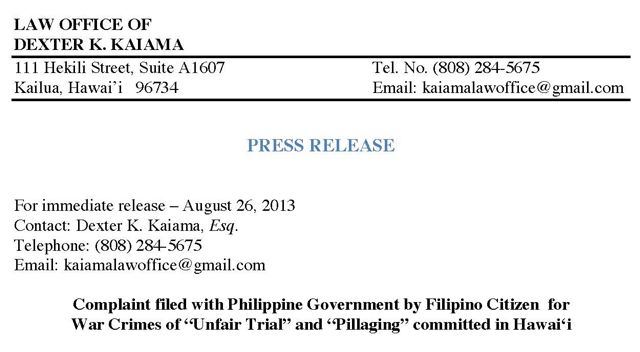
KAILUA, O‘AHU, August 26, 2013 — On August 15, 2013, a complaint for war crimes was filed with the Philippine government on behalf of my client, Mrs. Maria Alma Pilapil, pursuant to Philippine Republic Act no. 9851 (2009), known as the “Philippine Act on Crimes Against International Humanitarian Law, Genocide, and Other Crimes Against Humanity,” with the Philippines Consulate in Honolulu. The complaint alleges that the war crimes of “unfair trial” and “pillaging” were committed against Mrs. Pilapil by Circuit Judge Ronald Ibarra, Bank of Hawai‘i officers and directors Peter M. Biggs, Sharon M. Crofts, Wayne Y. Hamano, Kent T. Lucien, Mark A. Rossi, Mary E. Sellers, Donna A. Tanoue, Haunani Apoliona, Mary G.F. Bitterman, Mark A. Burak, Michael J. Chun, Clinton R. Churchill, David A. Heenan, Peter S. Ho, Robert Huret, Martin Stein, Donald M. Takaki, Barbara J. Tanabe, Raymond P. Vara, Jr., Robert W. Wo, and Alton T. Kuioka. Also named in the complaint is Mitzi A. Lee, attorney for Bank of Hawai‘i, attorney Robert D.S. Kim, Kevin Shiraki, Jeannie Jorg Domingo, and Lieutenant Patrick Kawai of the State of Hawai‘i Department of Public Safety Sheriff’s Department, Hawai‘i Division, to include his superiors and deputies.
When Mrs. Pilapil, also known as Maria Alma Barbaso Schwartz, wife of Stephen Michael Schwartz, a U.S. citizen, took out a loan from Bank of Hawai‘i with her husband, Bank of Hawai‘i required the Schwartz’s to purchase a title insurance policy in the amount of the money borrowed, which was $1,499,999.00. The Schwartz’s paid a premium of $3,735.00 to Title Guaranty of Hawai‘i. Title insurance insures the accuracy of the title search done by Title Guaranty of Hawai‘i, and if the search is inaccurate and the title to the property is defective, the insurance pays off the balance of the loan. Evidence of a defect in title produced by Laulima Title Search and Claims, LLC, was provided to Bank of Hawai‘i, but it was willfully disregarded and the foreclosure proceedings continued.
A motion to dismiss was filed during the foreclosure proceedings based on evidence that the court is unlawful, under both international law and United States constitutional law, as a result of the United States illegal overthrow of the Hawaiian Kingdom government on January 17, 1893, and its prolonged and illegal occupation since the Spanish-American War in 1898. Mitzi Lee, attorney for Bank of Hawai‘i, provided no rebuttal evidence, and, without cause, Judge Ronald Ibarra denied the motion. This action constituted an “unfair trial” and a criminal complaint was filed with the Hawai‘i Police Department and the International Criminal Court. On June 29, 2013, Bank of Hawai‘i “pillaged” my clients’ property with the assistance of Lieutenant Kawai of the State of Hawai‘i Sheriff’s Department. The eviction was based on an unlawful order stemming from a court that did not have lawful authority in the Hawaiian Islands. My clients’ possession was valued at $2.2 million dollars.
In 2009, the Congress of the Philippines enacted the Philippine Act on Crimes Against International Humanitarian Law, Genocide, and Other Crimes Against Humanity. In this Act the “State shall exercise jurisdiction over persons, whether military or civilian, suspected or accused of a crime defined and penalized in this Act, regardless of where the crime is committed, provided…the accused has committed the said crime against a Filipino citizen.” The war crimes of “unfair trial” and “pillaging” are punishable offenses under the Act, and since the alleged crimes were committed outside of Philippine territory the alleged perpetrators are subject to extradition to the Philippines under the 1994 U.S.-Philippines Extradition Treaty (1994 U.S.T. Lexis 185). According to the Act:
“The most serious crimes of concern to the international community as a whole must not go unpunished and their effective prosecution must be ensured by taking measures at the national level, in order to put an end to impunity for the perpetrators of these crimes and thus contribute to the prevention of such crimes, it being the duty of every State to exercise its criminal jurisdiction over those responsible for international crimes.”
Once the warrant for war crime(s) have been charged, my client demands the alleged perpetrators be extradited to the Philippines for prosecution to the full extent of the law.
Click here to view the article.